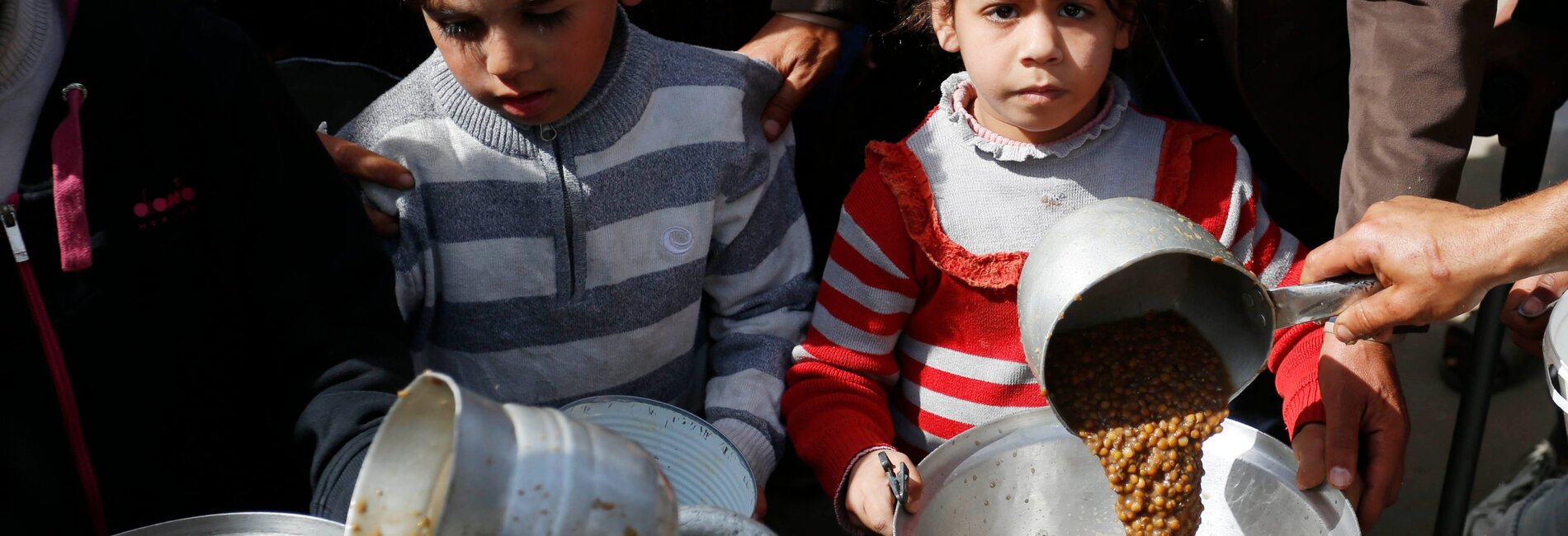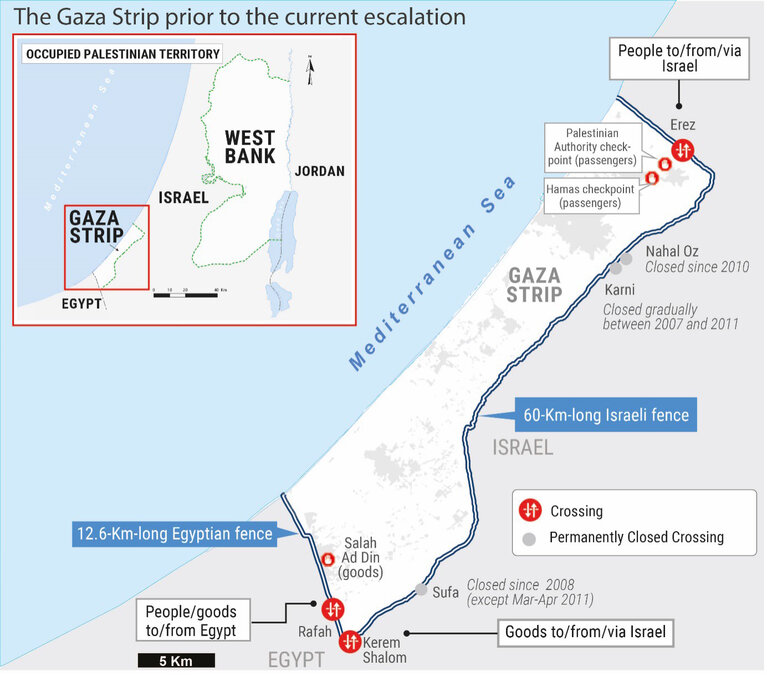Hostilities in the Gaza Strip and Israel | Flash Update #140
Key Highlights
- The World Health Organization and partners delivered medical supplies sufficient for 80,000 patients to Al Aqsa Hospital in Deir al Balah on 13 March.
- The hunger crisis in Gaza is deepening, rendering almost the entire population reliant on food aid that remains insufficient to address soaring needs.
- During the first two weeks of March, 12 humanitarian aid missions to northern Gaza were facilitated by the Israeli authorities, six were denied, and six were postponed.
Gaza Strip Updates
- Intense Israeli bombardment and ground operations as well as heavy fighting between Israeli forces and Palestinian armed groups continue to be reported across much of the Gaza Strip, particularly in the Hamad area of Khan Younis, resulting in further civilian casualties, displacement, and destruction of houses and other civilian infrastructure.
- Between the afternoon of 14 March and 10:30 on 15 March, according to the Ministry of Health (MoH) in Gaza, 149 Palestinians were killed and 300 Palestinians were injured. Between 7 October 2023 and 10:30 on 15 March 2024, at least 31,490 Palestinians were killed in Gaza and 73,439 Palestinians were injured, according to MoH in Gaza.
- Between the afternoons of 14 and 15 March, according to the Israeli military, there were no Israeli soldiers killed in Gaza. As of 15 March, 247 soldiers have been killed and 1,476 soldiers injured in Gaza since the beginning of the ground operation, according to the Israeli military. In addition, over 1,200 Israelis and foreign nationals have been killed in Israel, the vast majority on 7 October. As of 15 March, the Israeli authorities estimate that 134 Israelis and foreign nationals remain captive in Gaza, including fatalities whose bodies are withheld.
- The following are among the deadly incidents reported on 13 and 14 March:
- On 13 March, at about 20:00, six Palestinians were reportedly shot and killed and others injured while they were waiting for aid supplies at Al Kuwaiti roundabout, at the entrance to Gaza city.
- On 14 March, at about 7:00, seven Palestinians were reportedly killed and others injured when a house in Al Bureij Refugee Camp, Deir al Balah, was hit.
- On 14 March, 20 Palestinians were reportedly killed, and more than 155 others were injured, while waiting for aid supplies at Al Kuwaiti roundabout, at the entrance to Gaza city city.
- On 14 March, the World Health Organization (WHO) Director-General, Tedros Adhanom Ghebreyesus, reported that WHO and partners had delivered medical supplies sufficient for 80,000 patients to Al Aqsa Hospital in Deir al Balah the previous day. Some 140 health workers, 70 per cent of them volunteers, are serving 650 hospitalized patients, in addition to about 250 patients treated in the emergency room daily. In addition to health service needs, the hospital is struggling with water, sanitation, hygiene and waste management, with some 7,000 internally displaced persons (IDPs) sheltering in two of the hospital’s warehouses. Al Aqsa is one of only 12 out of 36 hospitals across Gaza that remain partially functional. Of these, only two are providing maternity services, although it is estimated that some 180 women are giving birth every day in Gaza, and that 21,000 have delivered since the current conflict began. UNFPA has provided basic supplies to a doctor who has set up operations in a tent in a site established for 40,000 IDPs in Rafah. Dr. Mohamed Ragab, used to work as a gynaecologist and obstetrician at the Nasser Medical Complex in Khan Younis, before damage to the hospital rendered it non-functional, following an Israeli military operation in February. Now treating up to 70 women every day, he stated that his operation “might be the only place in the displacement camps where we can provide antenatal and pregnancy care.” The WHO Director-General concluded that “the conditions in which people in Gaza are receiving health care are inhumane. We reiterate in the strongest terms our appeal: to protect health and civilian infrastructure; to allow us and partners safe and sustained humanitarian access; [and] for a ceasefire.”
- The hunger crisis in Gaza is deepening, rendering almost the entire population reliant on food aid that remains insufficient to address soaring needs. The Humanitarian Coordinator, Jamie McGoldrick, has emphasized that road transport is the only solution for scaling up the flow of aid. This week, WFP delivered 88 metric tons of food parcels and wheat flour for 25,000 people in northern Gaza, while warning that “famine is imminent” if the amount of aid to the area is not “exponentially” increased. During the first two weeks of March, 12 humanitarian aid missions to northern Gaza were facilitated by the Israeli authorities, six were denied, and six were postponed.
West Bank Updates
- Since 7 October, 418 Palestinians have been killed, including 407 by Israeli forces, nine by settlers and two by either Israeli forces or settlers, across the West Bank, including East Jerusalem. These include 109 Palestinians killed since the start of 2024 (compared with 80 during the same period in 2023), the vast majority by Israeli forces. Some 4,690 Palestinians have been injured, including 724 children, since 7 October in the West Bank.
- The Israeli authorities have announced measures on the entry of Palestinians holding West Bank IDs, with valid permits and magnetic cards, to Al Aqsa Mosque on the first Friday of the month of Ramadan (15 March), limiting entry to children under 10 years of age, women over 50, and men over 55. In 2023, men over 55, women of all ages and children under 12 were allowed entry without a permit on Fridays during Ramadan.
- Since 7 October, 15 Israelis, including four members of Israeli forces, have been killed and 99 injured in the West Bank, including East Jerusalem, and Israel.
- Between 7 October 2023 and 15 March 2024, over 300 Palestinian houses have been demolished in the West Bank, including East Jerusalem, resulting in the displacement of about 1,680 people, the majority (903) during operations carried out by Israeli forces especially in refugee camps in Jenin and Tulkarm. In addition, 640 people were displaced due to the demolition of their homes for lacking Israeli-issued building permits, compared to 705 displaced in the first nine months of 2023. Nearly 140 people were also displaced due to the demolition of their homes on punitive grounds since 7 October, compared to 78 during the first nine months of 2023.
- On 14 March, armed Israeli settlers from the "Sde Efraim" settlement outpost raided the nearby village of Kafr Ni'ma in Ramallah and attacked Palestinians and their property, injuring one Palestinian, vandalizing and setting fire to vehicles and agricultural structures, and killing two sheep. Since 7 October 2023 and as of 15 March 2024, OCHA has recorded 646 Israeli settler attacks against Palestinians that resulted in Palestinian casualties (59 incidents), damage to Palestinian-owned property (513 incidents), or both casualties and damage to property (74 incidents).
Funding
- The Flash Appeal for the occupied Palestinian territory (OPT), which requests US$1.2 billion to meet the critical needs of 2.7 million people across the OPT (2.2 million in the Gaza Strip and 500,000 in the West Bank, including East Jerusalem), was extended through the end of March 2024. As of 15 March, member states disbursed nearly $974 million for the updated Flash Appeal (79 per cent); this includes about $616 million out of $629 million (98 per cent) requested for October-December 2023 and about $358 million out of $600 million (60 per cent) requested for January-March 2024. For funding analysis, please see the Flash Appeal Financial Tracking dashboard.
- During February 2024, the OPT Humanitarian Fund (OPT HF) had a total of 122 ongoing projects, for a total of US$ 74.5 million, addressing urgent needs in the Gaza Strip (83 per cent) and West Bank (17 per cent). Projects focused on the areas of Education, Food Security, Health, Protection, Emergency Shelter & NFI, WASH, Coordination and Support Services, Multi-Purpose Cash Assistance and Nutrition. Of these, 77 projects were being implemented by international NGOs (INGOs), 29 projects by national NGOs (NNGOs), and 16 projects by UN agencies. Of the 93 projects implemented by INGOs or the UN, 52 were being implemented in partnership with NNGOs. The OPT HF has also recently finalized its critical and time sensitive First Reserve Allocation of 2024, titled "Emergency Fleet Augmentation for Enhanced Gaza Aid Delivery", amounting to US$3.5 million. The allocation aims at boosting the aid transport capacity to enable humanitarian partners to increase the delivery of vital aid and services to people across the Gaza Strip. For a summary of the OPT HF activities in February 2024, please follow this link. Since 7 October, the OPT HF has received a total of $88 million in contributions from member states and private donors. Private donations are collected directly through the Humanitarian Fund.
For the Humanitarian Needs and Cluster Response Update for the period between 5 and 11 March, please visit: Humanitarian needs and response update | 5-11 March 2024.The update was initially published on 11 March and new content has been subsequently added.
* Asterisks indicate that a figure, sentence, or section has been rectified, added, or retracted after the initial publication of this update.











